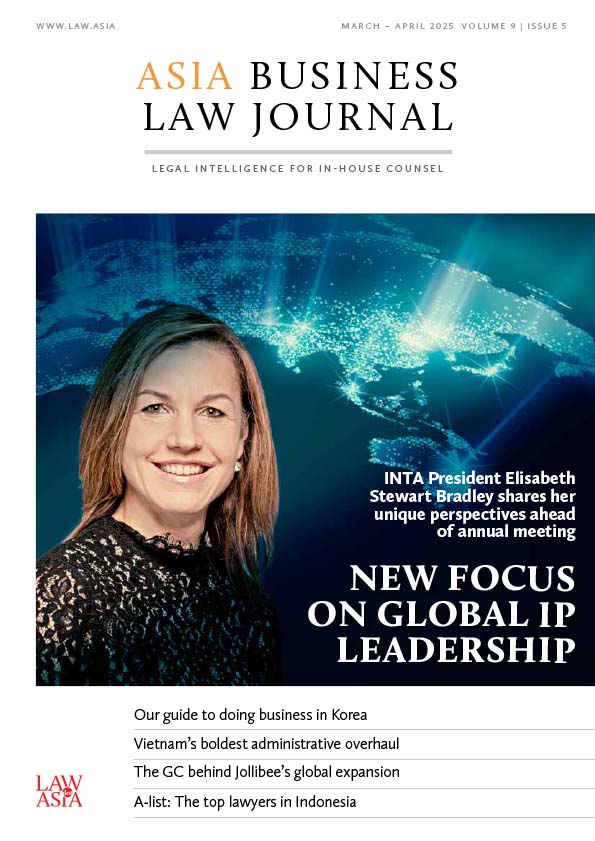Asia Business Law Journal – September/October 2022
Volume 7, Issue 2
Subscribers can sign in to access the following PDF.
You must be a
subscribersubscribersubscribersubscriber
to read this content, please
subscribesubscribesubscribesubscribe
today.
For group subscribers, please click here to access.
Interested in group subscription? Please contact us.
你需要登录去解锁本文内容。欢迎注册账号。如果想阅读月刊所有文章,欢迎成为我们的订阅会员成为我们的订阅会员。
Highlights:
Read between the lines
Proceed with caution to avoid risks
While the global economy faces soaring inflation and a myriad of headwinds, Asia is managing to keep a positive long-term outlook. The Regional Comprehensive Economic Partnership (RCEP), the world’s largest trade deal that went into effect in January this year, brought hope to boost intra-Asian trade and investment, attracting more investments in clean tech, manufacturing and e-commerce.
Missing the RCEP train, the US recently enacted the CHIPS and Science Act, 2022 that entices semiconductor companies, many of which are based in Asia, with USD53 billion in grants and up to 25% in investment tax credits for capital expenses with a caveat: Cut China and other countries of particular concern off from their semiconductor chain.
On the other hand, the steady rise of national security review regimes around the world has continued to dampen foreign direct investment (FDI) activity. Our Cover story gathers opinions from legal experts in the region to meet these challenges and chart possible strategies for navigating this fickle environment.
For example, scenarios such as special technical security review agreements, proxy control, or spinning-off certain assets and product lines that present national security issues could become common workarounds. Investors may also consider investment targets in Latin America and Southeast Asia, where they may not face stringent national security scrutiny. Don’t miss this must-read investment analysis.
Our Intelligence report delves into the highly active tech sector. What a tangled Web highlights novel issues that have confronted legal professionals in the metaverse. Copyright and trademark disputes convolute decentralised technologies while unregulated content poses difficulties in legal enforcement beyond the platform space. For those considering expanding their business realm to the metaverse, liability risk mitigation and data privacy laws are the priorities to ponder.
Still in decentralised technologies, Damage controls looks into South Korea’s prudent approaches to regulating the crypto market, especially after the collapse of TerraUSD. The country took fierce action against crypto exchanges that resulted in companies closing their shops, but has now softened its tone by considering regulations to strike a balance between blockchain development and investor protection. And the new president has vowed to implement crypto-friendly policies after all.
In this issue, we present an exclusive interview with Johannes Benjamin R Bernabe, the officer-in-charge of the Philippine Competition Commission, who in Against the clock is racing to instigate changes before his term ends in January 2023. Within a limited time, he focuses on key priorities to ensure a clean slate for a new chair and set of commissioners.
Our issue also features insights from Du Jin, general counsel and assistant president at China-based Hytera Communications, for companies to act Fair & square in contending with increased regulation at home and abroad. The company has been committed to improving its compliance management in high-risk areas, and Du shares the strategies from anti-fraud and export control compliance perspectives.
Moving on to tax laws, our Head to Head explores different ways the policymakers are exploring methods to capture revenue. As governments move to exercise their policy choices, any uncertainties as to the effect of different measures must be resolved.
We are also excited to bring you the inaugural Japan Law Firm Awards 2022, where we recognise the top four law firms in the country that have proven to be the best, followed by firms coming top in their respective categories. Similar to Japanese companies, many of these law firms have expanded their presence abroad, in Southeast Asia and further afield in Europe and North America.
Finally, be sure not to miss our annual Korea A-List, which rounds up the top 100 lawyers in the country based on nominations from clients at home and abroad, as well as by their international peers.
Best wishes
Putro Harnowo
Editor,
Asia Business Law Journal
In this issue
Goodwin’s new Singapore office targets growing tech business
Goodwin opens its second Asian shop in Singapore with the relocation of Hong Kong-based private investment funds partner Gregory Barclay to lead the new office to assist clients in raising, deploying and lending capital in the region
An update of NFT law developments
The past year saw crypto art break through to the mainstream, and many lawsuits involving non-fungible tokens making headlines. How are the region’s regulators responding?
Settling cross-border commercial disputes in Singapore
Connectivity, an efficient legal system and a plethora of choice are making Singapore increasingly popular for resolving international disputes
Japan Law Firm Awards 2022
Asia Business Law Journal names the top firms in Japan
Damage controls
Korea takes hard look at creating safe space for cryptocurrency
Tests for apparent bias in international arbitration
When doubt arises over an arbitrator’s impartiality, case law provides options to assess the appearance of bias, but some ambiguity may remain
Fair & square
In-house lawyers can provide valuable guidance in compliance matters if brought in at the right time
Korea’s top 100 lawyers 2022
Following an extensive nomination process, Asia Business Law Journal unveils the top performers of South Korea’s legal profession

































